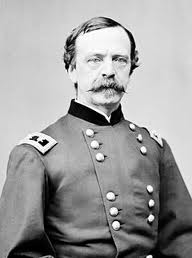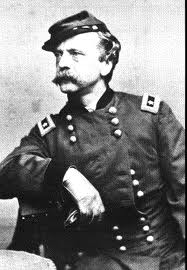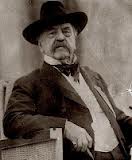 Sickles Gettysburg Hero or Medal of Honor Fraud? Daniel Sickles was in and out of scandals most of his life, but somehow always landed on his feet. Born in New York, in 1819, he went to New York University, studied law and was also apprenticed to a printer. He joined the Bar, a more lucrative profession, serving as a Corporation Attorney and also was elected to the New York Assembly. President Pierce sent him to the London Legation from 1853 to 1855, then he served in the New York Senate, then to the U.S. Congress from 1857 to 1861.
Sickles Gettysburg Hero or Medal of Honor Fraud? Daniel Sickles was in and out of scandals most of his life, but somehow always landed on his feet. Born in New York, in 1819, he went to New York University, studied law and was also apprenticed to a printer. He joined the Bar, a more lucrative profession, serving as a Corporation Attorney and also was elected to the New York Assembly. President Pierce sent him to the London Legation from 1853 to 1855, then he served in the New York Senate, then to the U.S. Congress from 1857 to 1861.
He was censured by the New York State Assembly for escorting a known prostitute, into its chambers. He also reportedly took her to England, leaving his pregnant wife at home, and presented her to Queen Victoria.
Daniel Sickles first gained national attention when in 1859 he shot and killed, in front of the White House, his young wife’s lover, Francis Barton Key, the son of Francis Scott Key, the author of the Star Spangled Banner. During the trial, in which he was represented by Edwin M. Stanton, Sickles pleaded, (self-defense of one’s wife, as his own property) or “temporary insanity” and was acquitted. He baffled both critics and fans by publicly forgiving his unfaithful spouse, who was determined to be half his age and who took Key as her lover, while her husband had been in London.
When Civil War broke out, Sickles saw his chance for a fresh start. Offering his services, he raised enough men for a brigade and was soon rewarded with a brigadier’s star. Frequently absent from his command, seeking advancement in Washington, he nonetheless commanded his brigade, often at odds with his superiors. However, he demonstrated many soldierly qualities and he was utterly fearless in combat. He fought on the Peninsula and at Sharpsburg, commanded a Division at Fredericksburg; and in the campaign of Chancellorsville commanded III Corps.
 His prewar reputation as a womanizer and heavy drinker returned to him during his career as a division commander. Many officers complained that Hooker, Sickles, and Butterfield, had converted the army headquarters into a combination of bar and brothel. Sickles’ own headquarters were considered to be even worse. After fighting at Chancellorsville, Sickles retained command of the 3rd Corps, even after Hooker’s removal.
His prewar reputation as a womanizer and heavy drinker returned to him during his career as a division commander. Many officers complained that Hooker, Sickles, and Butterfield, had converted the army headquarters into a combination of bar and brothel. Sickles’ own headquarters were considered to be even worse. After fighting at Chancellorsville, Sickles retained command of the 3rd Corps, even after Hooker’s removal.
On the second day at Gettysburg, Sickles did not like the sector assigned to his men along Cemetery Ridge. It was too long and low to his liking and he omnipotently decided to advance to the Peach Orchard. If he had survived the battle unscathed he probably would have been court-martialed. Daniel Sickles was struck in the leg by a shell as his command was beginning its withdrawal and the leg was amputated. In 1867, he was breveted regular army major-general for his role in the battle and three decades later was awarded the Congressional Medal of Honor. He donated his leg to an army medical museum and in later years is said to have visited it.
During his recovery Sickles engaged in a feud with General Meade over his generalship and who had won the battle. As a result he was denied further field command and was assigned a series of special missions by the War Department.
Daniel Sickles, was sent on a diplomatic mission to Colombia; served as Military Governor of South Carolina; and in 1869 retired from the Army with the rank of Major General in the Regular Army.
President Grant appointed Sickles, Minister to Spain, where he was chiefly distinguished diplomatically by becoming the intimate friend of Isabella, the former Queen of Spain. He served again in Congress from New York, 1893-95; and for many years was the Chairman of the New York State Monuments Commission, a position from which he was removed in 1912 by reason of alleged misuse of funds.
Daniel Sickles was awarded the Congressional Medal of Honor in 1897 and the citation reads,
“Rank and organization: Major General, U.S. Volunteers. Place and date: At Gettysburg, Pa., 2 July 1863. Entered service at: New York, N.Y. Birth: New York, N.Y. Date of issue: 30 October 1897. Citation: Displayed most conspicuous gallantry on the field vigorously contesting the advance of the enemy and continuing to encourage his troops after being himself severely wounded.”
 Sickles is one of two Union Corps commanders not represented at Gettysburg by a statue; a story is that there was one planned for him, but Sickles misappropriated the funds. When asked once where his monument was, he replied, “the whole park is my monument!”
Sickles is one of two Union Corps commanders not represented at Gettysburg by a statue; a story is that there was one planned for him, but Sickles misappropriated the funds. When asked once where his monument was, he replied, “the whole park is my monument!”
Sickles died of “cerebral hemorrhage” in New York City on May 3, 1914. He was buried at Arlington National Cemetery.
Daniel Edgar Sickles, knew how to play the political game and will be remembered by some as a Gettysburg Hero or by others as a Medal of Honor Fraud.
Bummer


The word I would use to describe Sickles is rascal. He seems like one of those political figures (Edwin Edwards, the former governor of Louisiana is a more modern example) that you know you shouldn’t like but you still do for some reason. The type of politician who has more lives than a cat. Can’t believe he didn’t go farther in politics than he did after donating his amputated leg to the museum.
Louis,
Another for Sickles is scoundrel, rogue, unscrupulous or similar to the “King Fish” of Louisiana. The “old guy” is still searching for others that inspire.
Bummer